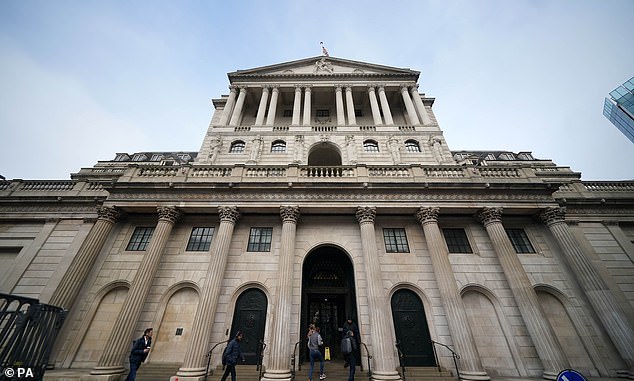Table of Contents
Along with the warmer weather, there are good signs that the economy is improving as well.
The figures published today by the British Retail Consortium (BRC) are very surprising and show that price inflation for both food and non-food is falling.
The particularly positive point in the BRC trade price index for April is that non-food prices were deflationary, falling 0.6 percent.
Overall, the index shows that annual inflation slowed to 0.8 percent in April, well below the three-month average and the lowest since December 2021.
Both fresh food and ambient food inflation fell to their lowest level in more than two years.
Positive signs: Labor market conditions are easing, which is one of the indicators the Bank of England uses to assess whether conditions are suitable for cutting interest rates.
Fierce competition and heavy promotion among retailers are behind the declines, mainly in footwear and clothing, as they struggle to keep customers visiting stores.
Retailers – especially supermarkets – are criticized for raising prices just as raw material costs begin to rise, rather than bearing some of the impact themselves.
It is difficult to know to what extent the current price decline is due to lower input costs or promotions to maintain market share.
Or a little of both. What is certain is that a tremendous battle is underway to drive consumer demand.
Based on my own weekend shopping, the fight is getting fiercer rather than subsiding.
Prices at Waitrose for plants and other home products are cheaper than at Homebase. This is a big change in the competitive spirit.
Along with the fall in prices comes a new forecast from Oxford Economics which predicts significant growth for the UK with the economy set to expand by 0.3 per cent in the second quarter, following the 0.4 per cent rise in the first quarter.
Oxford cites S&P Global’s recent flash survey that showed the composite Purchasing Managers’ Index (PMI) hit an 11-month high of 54.0.
And final PMI results due soon are likely to match those preliminary reports, confirming forecasts that the economy is turning around.
Labor market conditions are also easing, which should lead to a slowdown in wage growth, one of the red indicators the Bank of England uses to assess whether conditions are right to cut interest rates.
Are there enough signs that inflation pressures are falling fast enough for the Bank to be so bold?
Without a doubt, inflation is falling while wage growth is slowing. Apart from the usual warnings about supply shocks arising from geopolitical tensions, the outlook for commodities such as oil and gas appears stable.
In fact, milder weather across Europe this winter and spring (yes, even here in the UK, despite the April rain) means gas storage levels in Europe sit at 58 per cent.
ING predicts that they will be completely full for next winter and that gas prices could even drop. Another excellent reason why the Bank should go ahead and cut next week.
Acquisition theater
There was a time when corporate takeovers were as compelling as any West End or Broadway blockbuster.
The main characters would confront each other with the most brutal language, brandishing threats and criticizing each other’s companies without fear or favor.
The pranks would continue for months, but at least the predator would be forced to pay the highest price, allowing the prey to claim some victory for having secured the best value for its shareholders.
It doesn’t seem like it anymore. With a few exceptions, today’s corporate leaders either give up at the first sign of a shilling or sit back and wait for the offers to come in.
Are bosses less confident than their predecessors? Or more greedy? That’s the impression from recent acquisitions and perhaps another reason why valuations are so low.
The bosses of Anglo American and Royal Mail should go back to some of those aggressive corporate takeovers of the 1980s and 1990s to learn a few lines.
Heading to Madrid
And once upon a time Puig, the Spanish fashion and fragrance giant, might have been heading to London to get the best valuation for its IPO.
Instead, it is listed this week on the Madrid Stock Exchange. Madrid is doing well. Spanish clothing retailer Tendam and Hotelbeds are preparing their IPOs in the coming months.
It would be interesting to know if the top brass at the London Stock Exchange addressed President Marc Puig or if they have been in contact with the others.


